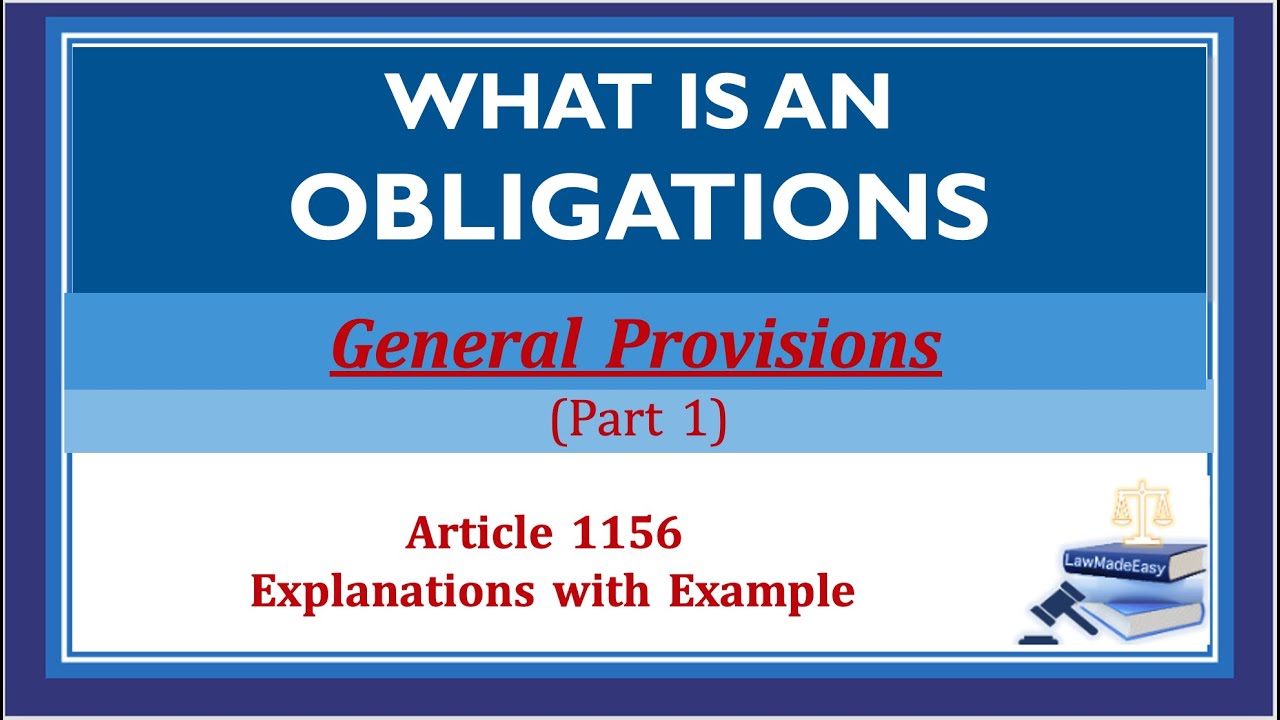Remission or Condonation. Article 1270-1274. Extinguishment of Obligations.Obligations & Contracts.
Summary
TLDRThis video script discusses the third mode of extinguishment of obligation, specifically condemnation or remission, as outlined in articles 1270 to 1274. It explains that condemnation is a gratuitous abandonment of a creditor's right, which must be accepted by the obligor and comply with donation forms. The script details the requisites for condemnation, including it being gratuitous, accepted by the obligor, and not in officious. It also covers the presumptions related to the delivery of private documents evidencing credit and the effect on accessory obligations. Article 1274 focuses on the presumption of remission of the accessory obligation of pledge when the pledged item is found in the possession of the debtor or a third party.
Takeaways
- 📜 Condemnation or remission is the third mode of extinguishment of obligation, discussed in articles 1270 to 1274.
- 🎁 Condemnation is defined as the gratuitous abandonment by the creditor of his right, akin to a form of donation.
- 🤝 Acceptance by the obligor is required for condemnation or remission, making it a bilateral act.
- 🚫 Condemnation must not be in officious, meaning it cannot exceed the capacity of the creditor.
- 📝 If condemnation is express, it must comply with the forms of donations, including public instruments for certain obligations.
- 📅 Remission can be categorized by extent (complete or partial), form (expressed or implied), and date of effectivity (inter vivos or causa mortis).
- 🔍 The delivery of a private document evidencing a credit by the creditor to the debtor implies a renunciation of the action, unless proven otherwise.
- 🧐 If a private document evidencing a debt is found in the debtor's possession, it is presumed that the creditor delivered it voluntarily.
- 💡 The extinguishment of the principal obligation also extinguishes the accessory obligations, but not vice versa.
- 🔑 A presumption arises that the accessory obligation of pledge has been remitted if the pledged item is found in the possession of the debtor or a third person.
Q & A
What is the third mode of extinguishment of obligation discussed in the script?
-The third mode of extinguishment of obligation discussed in the script is condemnation or remission, which is covered by articles 1270 to 1274.
What is condemnation in the context of extinguishment of obligation?
-Condemnation is defined as the gratuitous abandonment by the creditor of his right. It is a form of donation and requires acceptance by the obligor.
What are the essential requisites for condemnation or remission?
-The essential requisites for condemnation or remission include that it must be gratuitous, accepted by the obligor, the parties must have capacity, it must not be in officious, and if made expressly, it must comply with the forms of donations.
How does the delivery of a private document evidencing a credit affect the obligation?
-The delivery of a private document evidencing a credit made voluntarily by the creditor to the debtor implies the renunciation of the action which the former had against the latter, unless it is claimed to be in officious.
What is the presumption when a private document evidencing a debt is found in the possession of the debtor?
-It is presumed that the creditor delivered it voluntarily, unless the contrary is proven.
How does the realization of the principal obligation affect the accessory obligations?
-The realization of the principal obligation extinguishes the accessory obligations, but the waiver of the latter does not affect the former.
What is the presumption under Article 1274 regarding the accessory obligation of pledge?
-It is presumed that the accessory obligation of pledge has been remitted when the pledged item, after its delivery to the creditor, is found in the possession of the debtor or a third person who owns the thing.
What happens to the principal obligation if the accessory obligation is extinguished?
-The principal obligation remains enforced even if the accessory obligation is extinguished.
What is considered an example of an accessory obligation?
-An example of an accessory obligation is a guarantee or a security interest, such as when someone pledges a watch as security for a loan.
What is the difference between express and implied condemnation or remission?
-Express condemnation or remission is made either verbally or in writing, while implied condemnation or remission is inferred from the conduct or language of the parties.
What are the different categories of remission mentioned in the script?
-The script mentions categories of remission based on its extent (complete or partial), its form (express or implied), and its date of effectivity (inter vivos or causa mortis).
Outlines

Этот раздел доступен только подписчикам платных тарифов. Пожалуйста, перейдите на платный тариф для доступа.
Перейти на платный тарифMindmap

Этот раздел доступен только подписчикам платных тарифов. Пожалуйста, перейдите на платный тариф для доступа.
Перейти на платный тарифKeywords

Этот раздел доступен только подписчикам платных тарифов. Пожалуйста, перейдите на платный тариф для доступа.
Перейти на платный тарифHighlights

Этот раздел доступен только подписчикам платных тарифов. Пожалуйста, перейдите на платный тариф для доступа.
Перейти на платный тарифTranscripts

Этот раздел доступен только подписчикам платных тарифов. Пожалуйста, перейдите на платный тариф для доступа.
Перейти на платный тарифПосмотреть больше похожих видео

Loss of the thing due. Article 1262-1269. Extinguishment of Obligations. Obligatins and Contracts.

Lei nº 10.406/2002 (Cód. Civil): Livro III, Título III, Cap. V, Seção V da Parte Especial-Das Águas

UPDATED DISCUSSION: What is an Obligation? Obligations and Contracts General Provision. Part 1.

Introduction to Extinguishment of Obligations (2020)

HAK DAN KEWAJIBAN WARGA NEGARA

Nature and Effect of Obligations (Part 1)
5.0 / 5 (0 votes)
